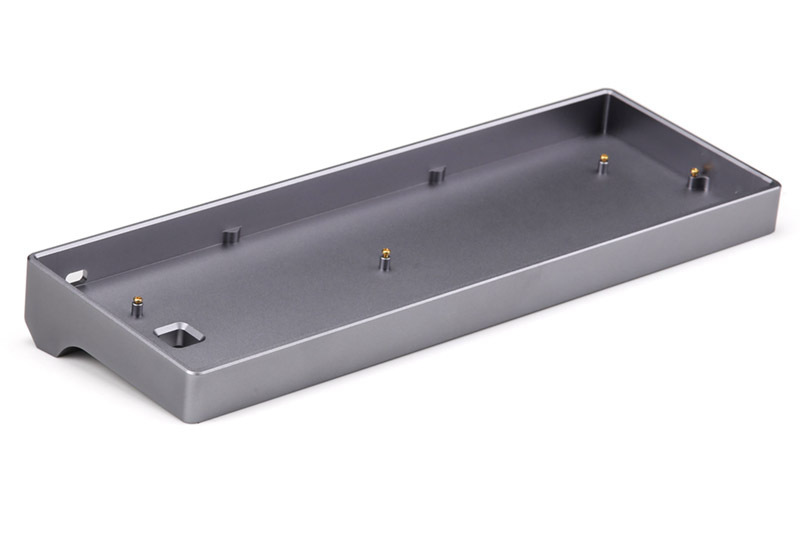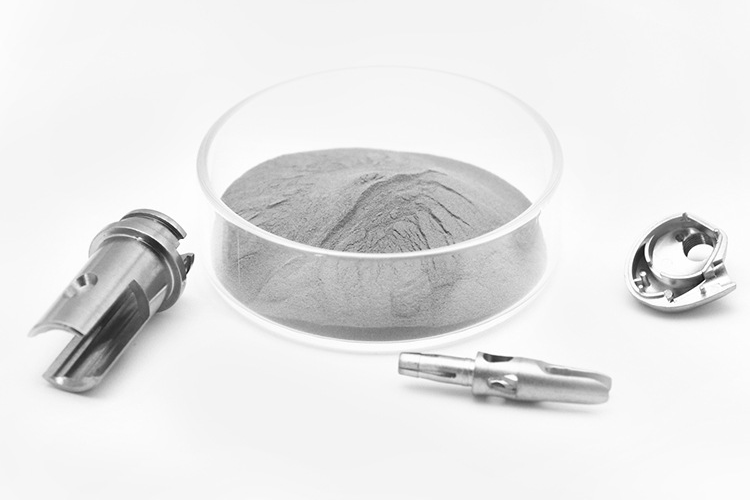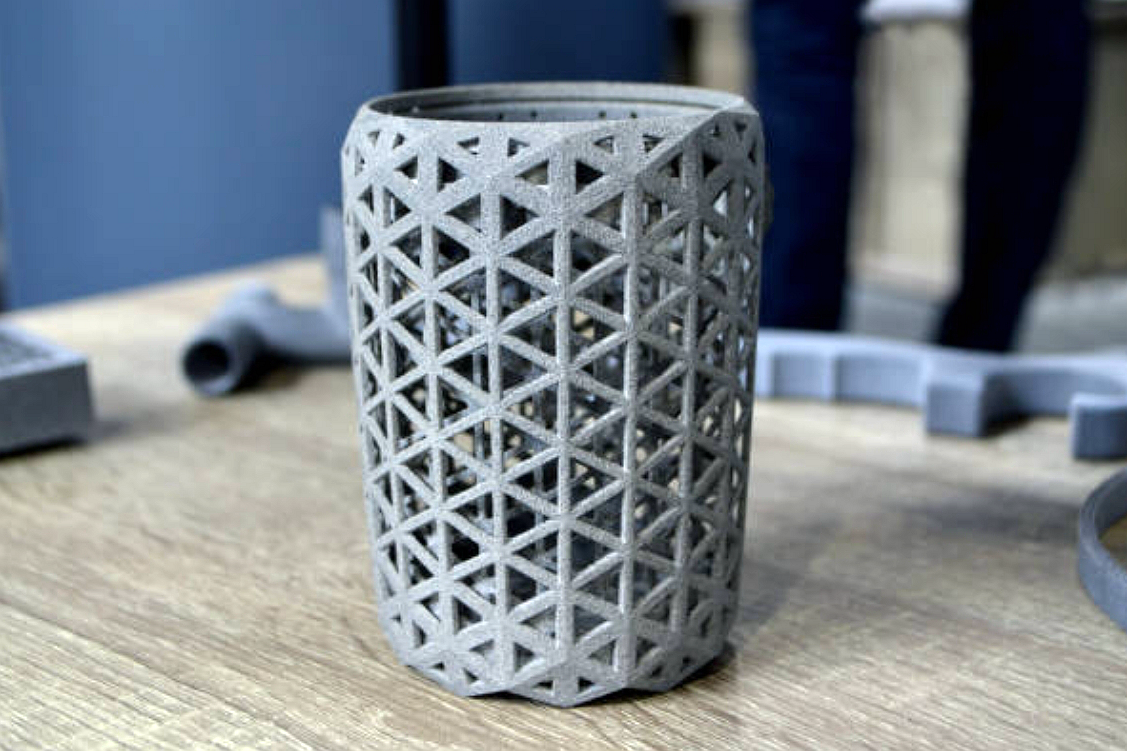Apple Inc | Metal and Plastic Injection Molding Supplier
Apple Inc. is a multinational technology company headquartered in Cupertino, California. It was founded by Steve Jobs, Steve Wozniak, and Ronald Wayne on April 1, 1976. Apple is known for its innovative consumer electronics, software, and services, including the iPhone, iPad, Mac, Apple Watch, and other products.
One of the popular products from Apple's portfolio is the Apple Bluetooth headset. Bluetooth headsets allow users to connect wirelessly to their devices and enjoy hands-free communication and audio streaming. These headsets have become increasingly popular due to their convenience and versatility.
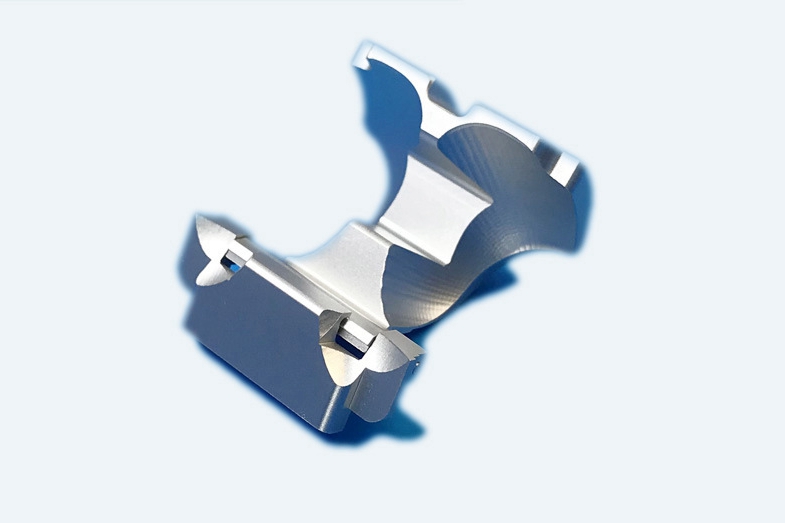
Metal and Plastic Injection Molding Applications in TWS Bluetooth Earphone
When it comes to the manufacturing process of Apple Bluetooth headset hardware, Apple relies on two key techniques: metal injection molding (MIM) and plastic injection molding. Let's briefly discuss the demand for each of these processes.
Metal Injection Molding (MIM)
Metal injection molding is a manufacturing process used to produce complex metal parts. It involves combining fine metal powders with a binding agent to create a feedstock material. This feedstock is then injected into a mold cavity, which undergoes high temperature and pressure to solidify and form the desired shape.
Metal injection molding is commonly used for small, intricate components that require high strength and precision. In the context of Apple Bluetooth headsets, MIM may be utilized for components such as the internal framework, housing, or structural elements that require the strength and durability of metal.
Plastic Injection Molding
Plastic injection molding is a versatile manufacturing process used to create a wide range of plastic parts. It involves injecting molten plastic material into a mold cavity, allowing it to cool and solidify before ejecting the final product.
Plastic injection molding offers several advantages, including cost-effectiveness, scalability, and the ability to produce complex shapes with consistent quality. In the case of Apple Bluetooth headsets, plastic injection molding might be used for components such as earpiece housing, buttons, or other non-structural elements where lightweight and design flexibility are key.
The demand for metal and plastic injection molding in producing Apple Bluetooth headsets can be attributed to Apple's commitment to delivering high-quality products with attention to detail, durability, and user experience. These manufacturing processes enable Apple to achieve the desired level of precision, strength, and aesthetics required for their Bluetooth headsets while meeting the demands of mass production.
Hinge and Plastic Case of TWS Bluetooth Headphones
The hinge and plastic case are essential components of TWS (True Wireless Stereo) Bluetooth headphones, providing structural support and housing for various internal components. Here's a brief overview of the hinge and plastic case in TWS Bluetooth headphones:
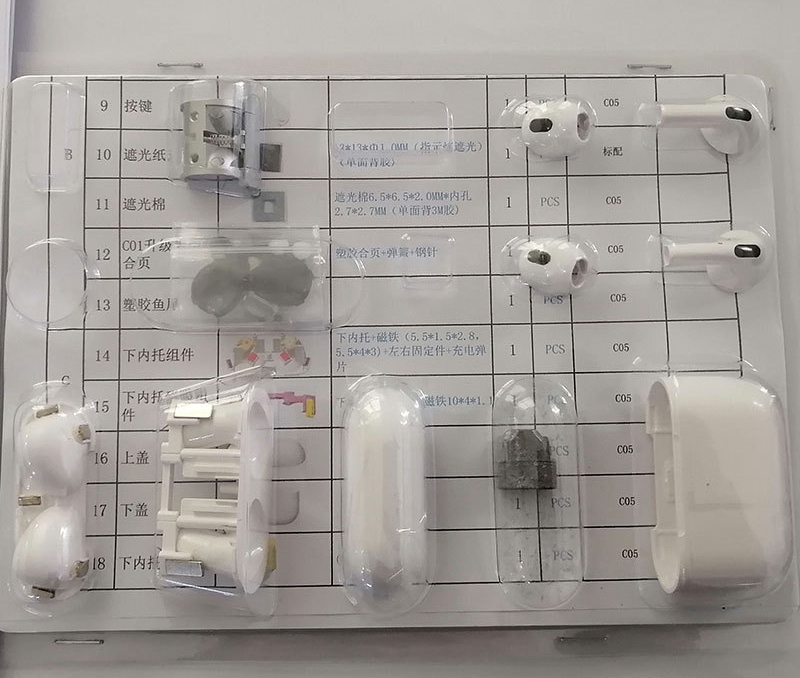
The hinge is a mechanical joint that connects the two earpieces of the TWS Bluetooth headphones, allowing them to open and close. It allows users to adjust the fit and position of the earpieces according to their preferences. The hinge needs to be durable and well-designed to withstand repeated opening and closing without compromising the structural integrity of the headphones.
Critical Considerations for the Hinges
Durability and Aesthetic
The hinge should be made from high-quality materials, such as durable metals or reinforced plastics, to ensure long-lasting performance. Usually, we use the following three methods to complete the manufacturing of hinges:
1. Metal injection molding is used to manufacture the hinge blank. The visible surface is polished, and PVD is treated to achieve long-term contact with human skin without wear, scratching, or fading. Often used in the manufacturing of high-end products.
2. Use zinc alloy die-casting to manufacture hinges. This solution is suitable for the manufacturing of mid-range products. The visible surface of the hinge is also polished or sandblasted and then chemically plated. This solution performs less than MIM+PVD, and the surface usually fades, scratches, or wears out within 1 to 2 years of use. There is also a fatal flaw in the chemical plating of zinc alloy, which is peeling from the inside and cracking on the surface.
3. Plastic injection molded hinges. This process is suitable for low-end products. They are installed after spraying and generally fade in 3 to 6 months. Product life does not exceed one year.
Therefore, when designing the product's appearance, we need to formulate the product's salt spray test requirements and scratch resistance performance requirements and understand the appearance differences of different processes.
Smooth Movement and Stability
The hinge should enable smooth and reliable movement, allowing the earpieces to open and close without friction or resistance.
The hinge should maintain stability and securely hold the earpieces, preventing unwanted movements or wobbling during usage
Smooth movement mainly involves fit clearance requirements. The more precise the coordination, the better it can ensure the regular operation of the product. The matching gap of electronic products within 0.1mm is sufficient to ensure the smooth operation of the product.
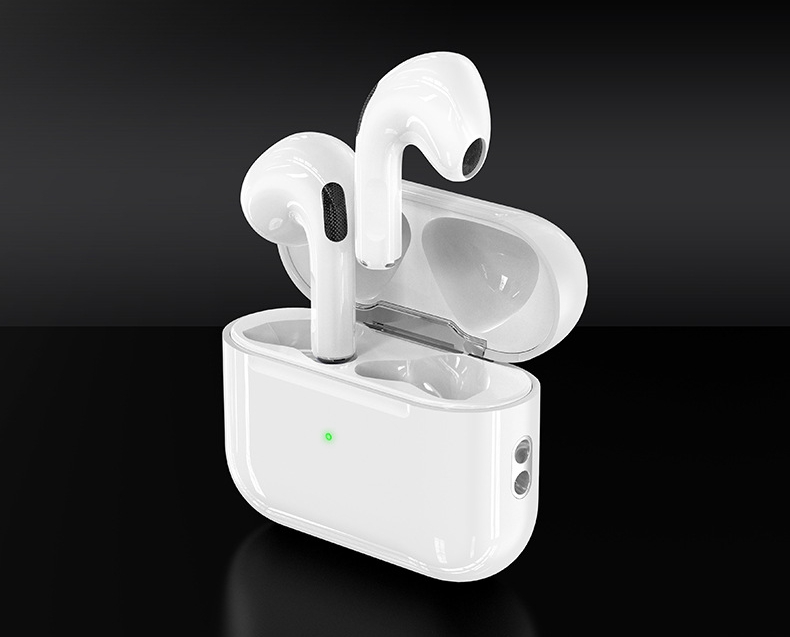
Plastic Case:
The plastic case, also known as the housing or shell, provides protection and houses various components of the TWS Bluetooth headphones, such as the drivers, batteries, and circuitry. It is crucial in maintaining the headphones' overall structural integrity, aesthetics, and user comfort.
Critical considerations for the plastic case include:
1. Material Selection: The plastic used for the case should be lightweight yet strong enough to protect the internal components from external impacts or damage.
2. Design and Aesthetics: The plastic case should align with Apple's design requirements, including shape, color, texture, and overall aesthetics, to ensure a visually appealing and recognizable product.
3. Ergonomics and Comfort: The plastic case design should consider the ergonomics of the human ear, providing a comfortable fit and secure placement during extended use.
4. Surface Finish: The plastic case may require specific surface finishes, such as matte, glossy, or textured, to achieve the desired look and feel in line with Apple's design language.
Meeting Apple's requirements for the hinge and plastic case of TWS Bluetooth headphones would involve adhering to their specifications for material selection, precision, quality standards, aesthetics, and functional performance. As mentioned earlier, Neway Precision Works Ltd must ensure its manufacturing processes align with Apple's supply chain management and sustainability considerations for these components.
Neway Brief Introduction
Neway Precision Works Ltd is a manufacturer with 30 years of experience in custom metal and plastic parts. During years of development, Neway has established metal injection molding, die casting, plastic injection molding, and sheet metal processing production departments. Neway has a strict material and quality control system. This is also the reason why some internationally renowned companies choose Neway.
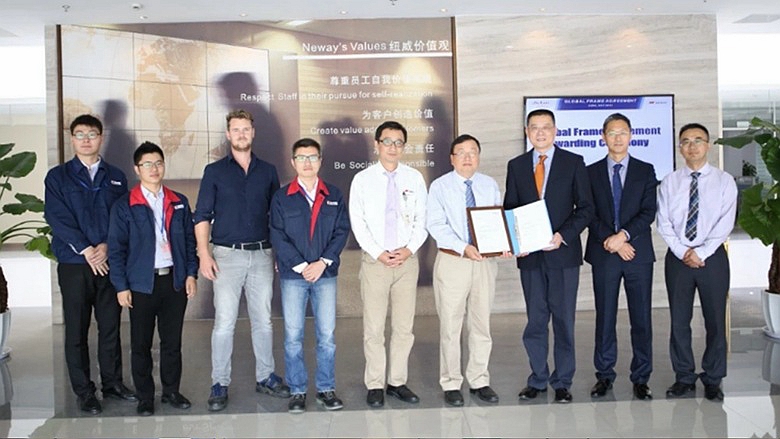
The first collaboration between Neway and Apple began with the developing of the first generation of Bluetooth headsets. Neway provides Apple with metal and plastic accessories for the first generation of TWS Bluetooth headsets. It mainly includes hinges, tail plugs, and plastic Bluetooth headset shells. So far, the TWS Bluetooth headset has been updated to the sixth generation. Neway still wins the favor of customers with high quality and strict quality control system.
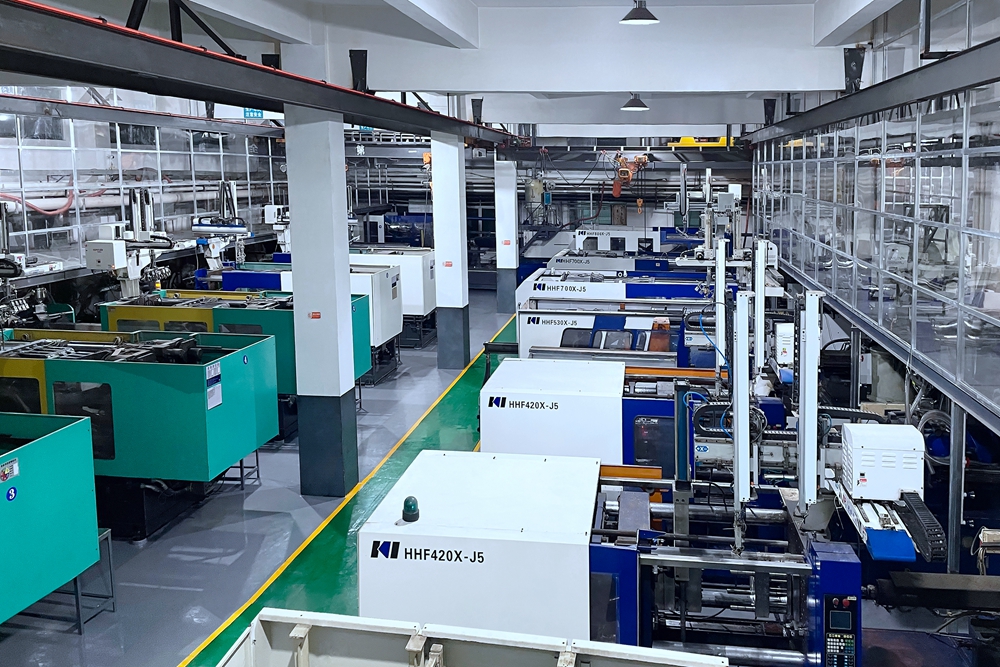
Neway mainly provides the following one-stop services:
1. Metal Injection Molding (MIM) Service
2. Ceramic Injection Molding (CIM) Service
3. Plastic Injection Molding Service
4. Die Casting Service
5. Sheet Metal Fabrication Service
6. Prototyping Service (CNC machining, 3D printing, Rapid Molding)
7. Design Engineering
8. Simple Assembly
Apple Inc.'s requirements in Custom Metal and Plastic Parts
Material Selection
Apple may have specific material requirements for their products' metal and plastic parts. These requirements could be based on strength, durability, weight, heat resistance, chemical resistance, and aesthetic properties.
Neway understands the importance of material selection in meeting Apple's specifications. Neway's strict material control system ensures that the metal and plastic materials used to produce parts meet Apple's requirements. In addition, Neway can customize materials. In addition to purchasing standard materials commonly used in the market, Neway can customize materials according to the specific requirements of the parts (such as physical properties, mechanical properties, table main requirements, etc.).
Precision and Tolerance
Apple products are known for their precise design and fit. Therefore, they may have strict requirements for the precision and tolerance levels of custom metal and plastic parts. Tight tolerances ensure that the parts fit together correctly and function properly.
Neway has complete quality testing equipment, including CMM, Optical Comparators, Surface Roughness Testers, X-ray scanners, Ultrasonic Testing Machines, etc. Neway strictly follows the PDCA quality control and incoming material control systems.
Quality Standards
Apple is renowned for its commitment to high-quality products. They may have stringent quality standards for all components, including custom metal and plastic parts. These standards could encompass dimensional accuracy, surface finish, consistency, and reliability.
Aesthetics and Finishing
Apple places a strong emphasis on the aesthetic appeal of its products. Custom metal and plastic parts must meet Apple's design requirements and may require specific surface finishes, textures, colors, or coatings to achieve the desired look and feel.
Sustainability and Environmental Considerations
Apple has made significant efforts to promote sustainability and reduce its environmental impact. They may require suppliers to adhere to environmental regulations, use eco-friendly materials, and implement sustainable manufacturing practices.
Neway is a production factory with ISO 9001 and RoHS qualifications. It has a PVD production line, which effectively avoids the environmental pollution caused by surface treatment.
Supply Chain Management
Apple may have specific requirements related to the supply chain, such as ensuring a reliable and efficient supply of custom metal and plastic parts, adhering to ethical and responsible sourcing practices, and maintaining a robust quality control process throughout the supply chain.
Neway has always firmly believed that meeting customer needs is the prerequisite for cooperation, and win-win is the basis of cooperation. If you want a stable and reliable custom metal and plastic parts supplier, don't hesitate to contact us.
Metal and plastic injection molding applications in the electronic industry
Both metal injection molding (MIM) and plastic injection molding find various applications in the electronic industry. Here are some common applications of these manufacturing processes:
Metal Injection Molding (MIM) in the Electronic Industry:
1. Connectors and Contacts: MIM is commonly used to produce small and intricate connectors and contacts for electronic devices. These components require high precision, complex geometries, and excellent electrical conductivity. Metal powders, such as iron powders, are mixed with binders to create a feedstock for the metal injection mold process.
2. Sensor Housings: MIM can manufacture sensor housings for electronic devices such as smartphones, wearables, and IoT devices. These housings protect sensitive sensors while allowing efficient signal transmission. The metal injection molding process enables the production of intricate and precise metal components for sensor assemblies.
3. EMI/RFI Shielding Components: MIM can produce electromagnetic interference (EMI) and radio frequency interference (RFI) shielding components. These parts help prevent unwanted electromagnetic radiation or interference that can affect the performance of electronic devices. Metal injection molding allows for creating of intricate and high-density metal structures for effective shielding.
4. Heat Sinks: MIM is used to manufacture heat sinks, which are critical for thermal management in electronic devices. Heat sinks help dissipate excess heat generated by electronic components, ensuring optimal performance and longevity. Metal injection molding enables the production of complex heat sink designs with improved thermal conductivity.
5. Microelectromechanical Systems (MEMS): MIM is applied to produce intricate components for MEMS devices. MEMS technology is used in various electronic applications, including accelerometers, gyroscopes, pressure sensors, and microphones. Metal injection molding allows for the fabrication of small and complex metal parts with high precision.
Plastic Injection Molding in the Electronic Industry:
1. Enclosures and Housings: Plastic injection molding is commonly used to produce enclosures and housings for electronic devices such as smartphones, tablets, laptops, gaming consoles, and consumer electronics. These components provide structural integrity, protection, and aesthetics. The plastic injection molding process involves melting plastic pellets and injecting the molten material into a mold cavity.
2. Connectors and Sockets: Plastic injection molding is employed to manufacture connectors and sockets used in electronic devices for various purposes, including power supply, data transfer, and peripheral connections. Precise plastic injection molds are used to create intricate connector designs.
3. Switches and Buttons: Plastic injection molding produces switches, buttons, and keypads for user interface components in electronic devices. These components require precise molding to ensure reliable functionality and user interaction. Plastic molding allows for consistent and durable switch and button components.
4. Cable Assemblies and Wire Management: Plastic injection molding produces cable assemblies, wire harnesses, and cable management components used in electronic devices to organize and secure cables for efficient routing and connectivity. Mold injection plastic processes create cable clips, connectors, and strain reliefs.
5. Mounting and Fixturing Components: Plastic injection molding is applied to produce mounting brackets, clips, and fixturing components that secure and position electronic components within devices or during assembly. These components are designed to provide stability and ease of assembly. Plastic injection molds enable the production of precise and durable mounting and fixturing components.
Why Choose Neway For Custom Metal and Plastic Parts Manufacturing
Neway Precision Works Ltd stands out as a preferred choice for custom metal and plastic parts manufacturing due to their extensive 30 years of industry experience and establishment of specialized production departments for metal injection molding, die casting, plastic injection molding, and sheet metal fabrication. Their strict material control system ensures the use of high-quality materials, while their robust quality control system guarantees the delivery of products that meet the highest standards. Additionally, Neway's one-stop services, including prototyping, design engineering, and simple assembly, provide a comprehensive solution for clients, streamlining the manufacturing process and ensuring customer satisfaction. These factors have earned Neway the trust of internationally renowned companies seeking reliable, top-quality custom metal and plastic parts.
